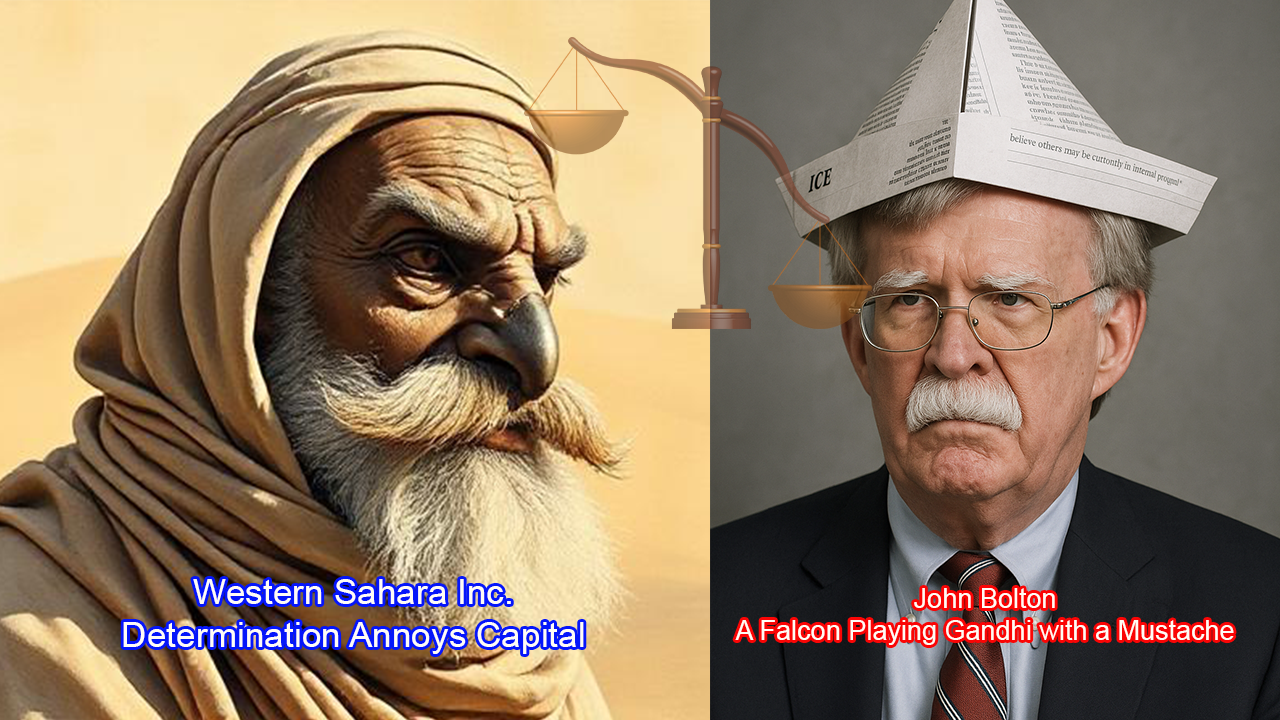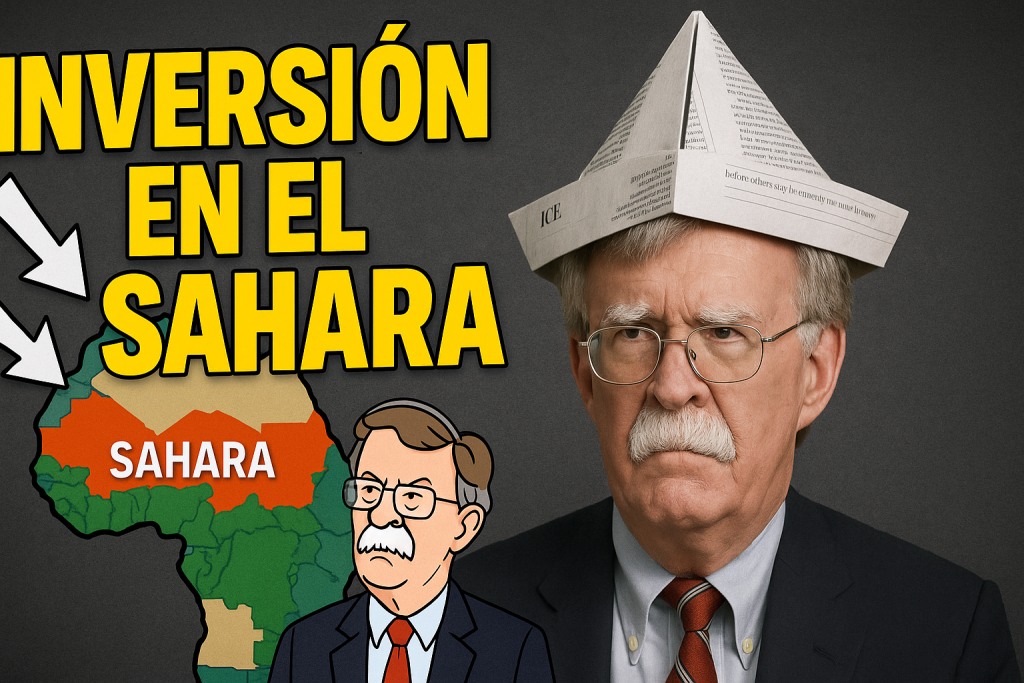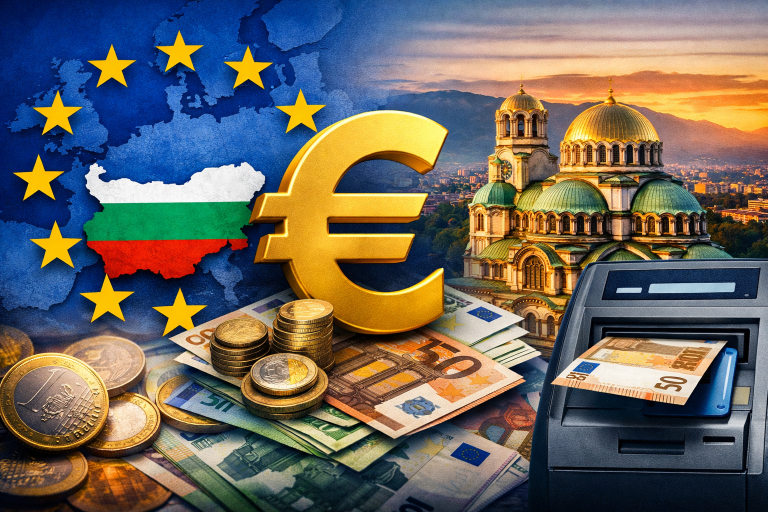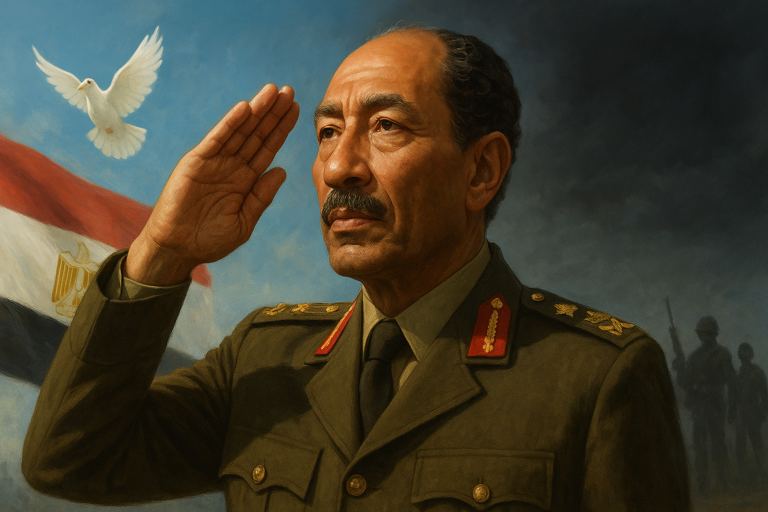
John Bolton and the Ghost of the Sahara
“Western Sahara: The Desert Where Principles Are Lost and Money Is Found”
By The Master
While the supposedly civilized world debates human rights, self-determination, and diplomacy, Western Sahara has become a game where more tangible things are played: phosphates, fishing, and geostrategic access to the Atlantic. Self-determination? Fine, thank you. Human rights? Only if they don’t get in the way of investors.
The Economy at Stake: Who’s Making a Fortune?
First, the obvious: Western Sahara is not just an endless desert. It is a territory rich in phosphates—essential for fertilizers—strategically valuable fish reserves, and possibly untapped hydrocarbons. Morocco, which de facto controls the territory, has been very efficient in turning this land into a source of income. Of course, efficient for its coffers, not so much for the Sahrawis.
From our perspective, the problem is not that Morocco wants to exploit its resources—we all want to prosper, right?—but that it does so without the consent of the original inhabitants, that is, without respect for the principles of property ownership or individual sovereignty. This is crony capitalism, not a free market.
The foreign companies investing there, especially European ones, are playing the “we’re not seeing” game. They claim there is stability and a reliable legal framework (which conveniently ignores the UN), while signing lucrative contracts with Rabat. And the Sahrawis, meanwhile, watch as their wealth is exported without seeing a peseta… or a dirham.
John Bolton: The Unwitting Comedian of Geopolitics
Now let’s talk about the gentleman with the bizarre mustache: John Bolton. The former US national security adviser has decided to become the defender of the Sahrawi cause. A position that, if it came from a principled pacifist like Donald Trump, would be worthy of respect. But coming from a hawk who has defended preemptive wars with the same casualness with which one orders coffee at the window of a Cuban cafeteria, it’s more laughable than credible.
In his crusade against Morocco, Bolton claims that the US recognition of the Sahara as Moroccan was a diplomatic disaster. How ironic! This same man was part of an administration that made geopolitical chaos its hallmark. If the world worked with poetic justice, Bolton’s tweets would be printed and used as toilet paper in the Tindouf camps.
The guy talks about principles and international law as if he hadn’t worked for an administration that enthusiastically despised both. And now he wants to teach diplomatic morality? Come on, John. Your thing is invading countries for oil, not defending Bedouins.
China and Russia: The New Masters of the Desert
While the West looks the other way or stumbles over its hypocrisy, China and Russia are steadily advancing. They invest, offer loans, sell weapons, open embassies… whatever is necessary to gain influence. They do it without moral demands, without annoying NGOs, and with frightening efficiency.
China sees the Sahara as a gateway to the Atlantic and the Maghreb. Russia, for its part, rubs its hands at the prospect of establishing a naval base there or, at least, annoying NATO. And the Sahrawis? Fine, thank you. As always, they remain in the background.
The Desert Is Not Empty, It’s Full of Cynicism
Western Sahara is a perfect symbol of the current world order: a combination of diplomatic hypocrisy, economic opportunism, and disregard for individual rights.
From a libertarian perspective, the solution lies neither in new colonial powers nor in Morocco’s “autonomy plan” (which smacks more of disguised subordination). It involves letting the Sahrawi people decide their destiny, managing their own resources, and negotiating on equal terms, not as pawns of others.

But of course, that doesn’t generate multi-million-dollar contracts… or headlines with a Bolton mustache.
P.S. If any Brussels bureaucrat or Washington advisor ends up reading this: the free market cannot be built on expropriation disguised as progress. And people are not chess pieces for their failed agendas.
P.S. 2: John, please keep your opinions coming. We always need quality comedy material.
Infographic: Natural Resources and Investment Flows in Western Sahara
- Key Natural Resources
Phosphates
The Bucraa mine is one of the largest open-pit mines in the world, with estimated reserves of 1.715 billion tons.
It represents approximately 2% of Morocco’s total phosphate production.
Fishing
The waters of Western Sahara are rich in fishery resources, especially species like the octopus.
Energy (Hydrocarbons and Renewables)
There are explorations for gas and oil in the maritime area off Cape Boujdour, promoted by the Moroccan Ministry of Energy and international companies.
Renewable energy projects, such as the development of green hydrogen in collaboration with companies such as Acciona and Cepsa, are underway in the region.
- Investment Flows and International Actors
Morocco
Through the Sharifian Phosphate Office (OCP), Morocco manages the exploitation of phosphates in Western Sahara.
It has invested in infrastructure such as ports and processing plants to facilitate the export of resources.
International Companies
Companies from countries such as Canada, Lithuania, and the United States have been involved in the purchase and processing of phosphates from Western Sahara.
European companies have participated in fishing agreements in the waters of Western Sahara, although some have been annulled by European courts for not having the consent of the Sahrawi people.
Investments in Renewable Energy
Green hydrogen and renewable energy projects are attracting investment from Spanish and Emirati companies, with the aim of exporting energy to Europe.
- Economic and Political Implications
The exploitation of natural resources in Western Sahara has been used by Morocco as a tool to consolidate its control over the territory and obtain diplomatic support.
The Polisario Front and other organizations have denounced these activities as illegal, arguing that they are carried out without the consent of the Sahrawi people.





